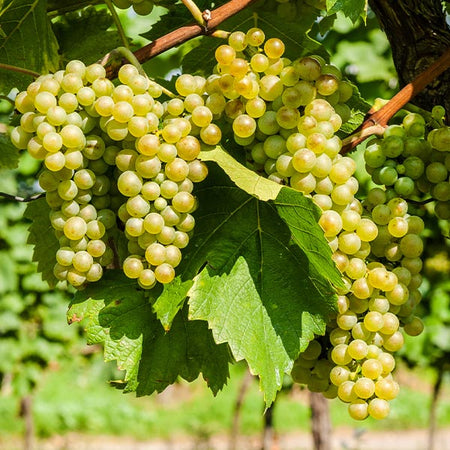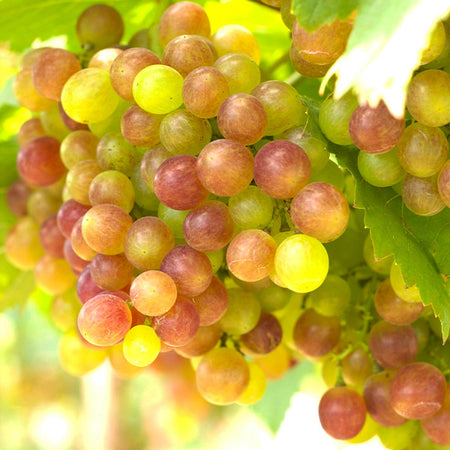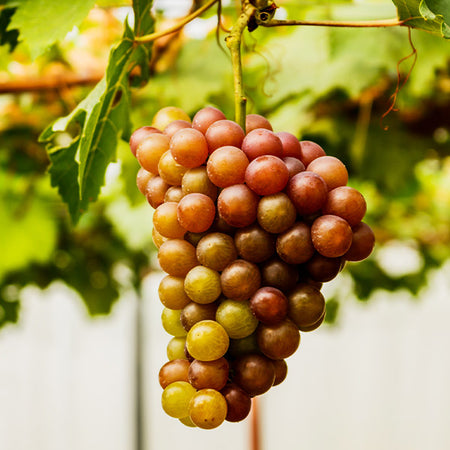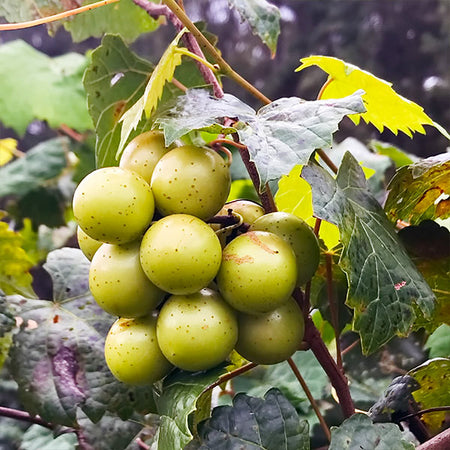Grape Vines
Showing 1 - 6 of 6 items
Starting at $96.99
Growing Zones: 5-9
Sold Out
Growing Zones: 7-9
Sold Out
Growing Zones: 7-10
Sold Out
Growing Zones: 7-10
Sold Out
Growing Zones: 7-10
Sold Out
Growing Zones: 7-10
Grow Your Own Grape Vines at Home!
Humans have been growing grapes for more than 8,000 years, making Grape Vines one of the most recognizable fruiting plants available.
They produce delicious, juicy fruit that can be eaten as a snack and used to make sweet juices - and of course, wine! And not only are they useful for producing fruit - grape vines can be beautiful ornamental vines that add life to arbors, trellises, patio walls, pergolas and more!
Read on to learn more about different types of grape vines, how to plant and care for grape vines and more.
Types of Grape Vines
There are thousands of grape varieties available - although fewer than 20 varieties make up the majority of worldwide grape production. Grapes are classified as table grapes, which are good for eating, and wine grapes, which are primarily used for winemaking. Some grape varieties can be used for both!
A few of our favorite grape varieties include:
Niagara Grape Vine: The most popular commercially grown grape in the USA, owing to its sweet, juicy green grapes that grow reliably year after year.
Concord Grape Vine: Concord Grapes require little maintenance and produce superb snacking grapes (you probably know the name from Concord Grape Jelly!). They are also hardy growers, even resilient in colder climates.
Carlos Scuppernong Grape Vine: The Carlos Scuppernong is known to producea a heavy yield of grapes that are irresistibly sweet on the tastebuds. It's great for jams, jellies, wines and juices.
Summit Grape Vine: The ideal grape vine for the beginner grower! The Summit Grape Vine grows well in warm climates and produce dense clusters of small grapes.
Triumph Grape Vine: Hardy, versatile and delicious - Triumph Grape Vines produce a fruit with a skin that some say is reminiscent of the taste of pineapples. They are drought-tolerant and grow fast in warm, humid environments.
Tara Scuppernong Grape Vine: Yielding up to 80 pounds of grapes per vine, the Tara Scuppernong is in high demand! Plus, unlike some grape varieties, the Tara is self-pollinating.
Benefits of Growing Grape Vines

Grapes vines add flair to your garden space or patio, growing in unique formations with lush green foliage and attractive clusters of fruit. Growing grape vines on a trellis or patio skirting can create a dramatic effect, the vines creating a curtain-like effect.
And, of course, you'll enjoy bundles of deliciously sweet fruit. You could even starting a home vineyard to produce a few bottles of your own wine! Homegrown grapes are also great for making jams and jellies, juicing and even eating fresh.
Whether you're looking for an attractive screening plant or you're starting your journey in viticulture, grape vines bring a space to life with their instantly recognizable fruit and unique growing habits.
How to Plant and Care for Grape Vines:
Most grape vines grow best in warm climates that have hot days and cool nights. Wine grapes do better in warmer climates, while table grapes can thrive in cooler regions.
When planting grape vines in your landscape:
- Select a planting site with full sun to get the best growth and grape yields from your vine. Limited shade is okay, but ensure your grape vine has morning sun.
- Grape vines enjoy deep, well-drained, loose soil with good air circulation.
- Train your Grape Vine to grow upwards by growing your grapes on a trellis or arbor. Grapes will need to grow up a post, and thereafter will grow horizontally along slats of wood, rope or wire, as is common in vineyards.
- If you have a canopy or patio fencing, consider letting the vines grow up and along, to form a screen or curtain. Alternatively, inserting stakes in the ground and connecting with wire or rope will allow for vineyard-like growing formations.
- Space vines out approximately 8 feet, and plant at the base of the post by digging a 12-inch hole.
- You should not need to fertilize your grapes in their first year. After, you can fertilize annually with a 10-10-10 fertilizer.
Get your own backyard grape vines!
Grape vines offer the home gardener a chance to grow one of the most widely loved fruits, with a long history of cultivation.
If you want to add a Mediterranean, vineyard-inspired touch to your backyard or patio, or you simply want to enjoy the fruits of your very own grape vines, it's easy to find the right grape vine for your climate and conditions. Explore our grape vines today!








